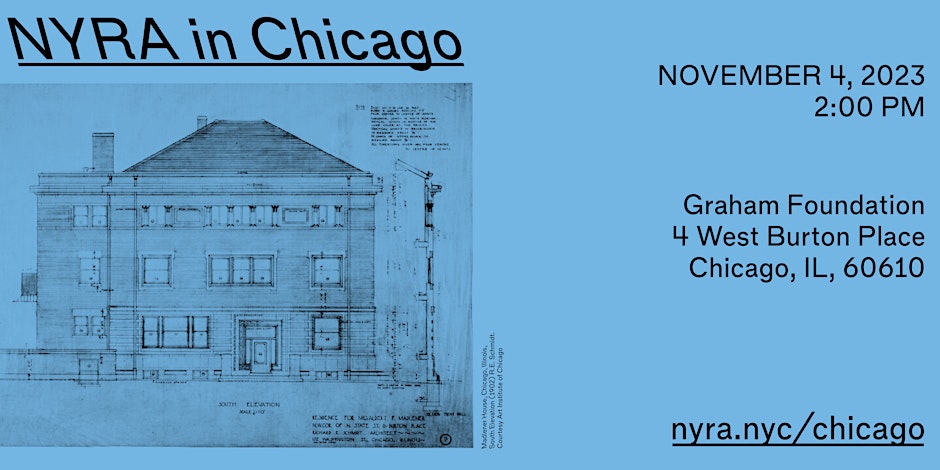-
today's events
Gallery and Bookshop Hours Chicago Architecture Biennial Jan 01, 2026 - Feb 28, 2026
-
upcoming events
Zosha Warpeha Lampo Performance Series Feb 21, 2026
-
past events
End-of-year Bookshop Sale Dec 13, 2025 - Dec 20, 2025
Eve Aboulkheir Lampo Performance Series Dec 06, 2025 Performance
Leila Bordreuil and Lee Ranaldo Lampo Performance Series Nov 08, 2025
Roc Jiménez de Cisneros Lampo Performance Series Oct 11, 2025
Concepción Huerta Lampo Performance Series Sep 27, 2025 Performance
Madlener House
4 West Burton Place
Chicago, Illinois 60610
Telephone: 312.787.4071
info@grahamfoundation.org
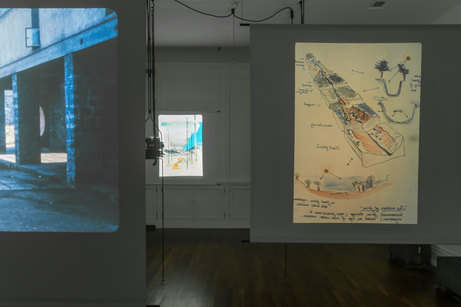
Join us for an introduction to the exhibitions currently on view, Pidgeon Audio Visual: Architects Speak for Themselves and Barbara Stauffacher Solomon: Exits Exist, led by Graham Foundation staff.
Walkthroughs run from 2:00–2:30 on the following dates:
Saturday, Feb 4
Saturday, Feb 11
Saturday, Feb 18
Saturday, Feb 25
Group tours are available by request, contact us at info@grahamfoundation.org
For more information on the exhibition, Pidgeon Audio Visual: Architects Speak for Themselves, click here.
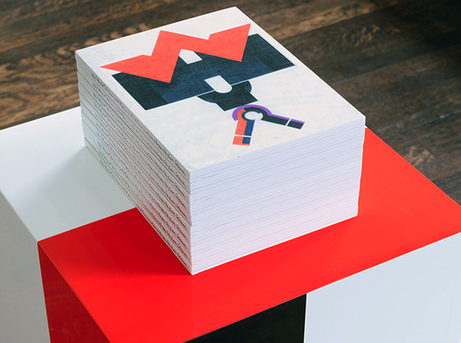
Visit the galleries during the winter bookshop sale in the final week of our current exhibitions, Pidgeon Audio Visual: Architects Speak for Themselves and Barbara Stauffacher Solomon: Exits Exist. All purchases in the bookshop will be 15% off with additional markdowns on select titles.
For gallery hours and timed-entry reservations, click here to book on tock.com/grahamfoundation
Visitor Guidelines
Please note: The audio component of the Pidgeon Audio Visual installation is only accessible to stream in the galleries through the exhibition's dedicated website on a mobile device. The use of a personal mobile device is encouraged and headphones are required. Headphones and chargers are available for use as needed.
The first-floor galleries and bookshop are accessible via outdoor lift. Please call ahead to make arrangements. The second-floor galleries and the third-floor ballroom, where events are held, are only accessible by stairs.
Group tours available by request
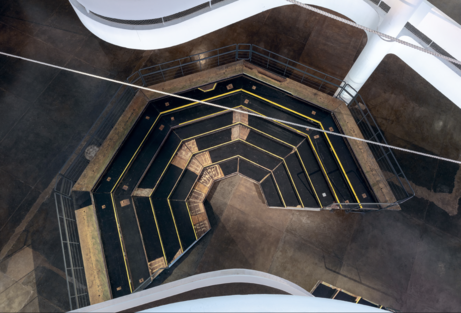
Join us for a discussion and presentation of deposition, a project by Marissa Lee Benedict, Daniel de Paula, and David Rueter centered on the displacement, exhibition, and reprogramming of a large-scale trading pit, salvaged from the grain room of the Chicago Board of Trade. In 2021, the obsolete seven-tier commodity trading pit floor was relocated to the center of Oscar Niemeyer’s Ciccillo Matarazzo for the 2021 São Paulo Biennial with support from a grant from the Graham Foundation. Benedict, de Paula, and Rueter will be joined by Karsten Lund, editor of their new book from Mousse Publishing that documents the project. Copies will be available for purchase in the Graham Foundation bookshop following the discussion.
About the publication:
Proceeding from the iconic installation deposition (2018–ongoing) by artists Marissa Lee Benedict, Daniel de Paula, and David Rueter in the central atrium of Oscar Niemeyer’s pavilion for the 34th Bienal de São Paulo, this volume traces the salvage, displacement, and exhibition of the last corn commodities futures trading pit from the Chicago Board of Trade. Essays and interviews provide divergent lenses from which to view the work, moving from intimate to distant, scanning over the object, the artists, the art institution, and the architectures of the geopolitical landscape in which these elements operate. Section by section, the book works through the multiple, and compacted, meanings of the word “deposition” (geologic, legal, art historical), layering images and texts to build concrete yet non-linear relations, as the 32 fragments of the former trading floor are dragged from Chicago to São Paulo.
deposition (Mousse Publishing, 2023) features the work of Marissa Lee Benedict, David Rueter, Daniel De Paula, and is edited by Karsten Lund with text by Yamila Goldfarb, Cameron Hu, and Ana Teixeira Pinto.
Daniel de Paula is a Brazilian visual artist and researcher. de Paula has been awarded the Mondriaan Funds Proven Talent Award and has exhibited widely at institutions such as MASP, São Paulo; The Renaissance Society, Chicago; Padiglione d’Arte Contemporanea, Milan; Kunsthal Gent; The Arts Club of Chicago; Estação Pinacoteca, São Paulo; and the 2022 Lyon Biennale. His work is represented by Francesca Minini Gallery and Lumen Travo Gallery, and has been reviewed in Artforum, Texte zur Kunst, Flash Art, Mousse Magazine, Folha de São Paulo, and Het Parool. He has participated in several international artistic residencies such as the Jan van Eyck Academie, FLACC, and KIOSKO.
Marissa Lee Benedict and David Rueter are visual artists, writers, and researchers working in collaboration since 2014. Benedict and Rueter have exhibited works at The US Pavilion for the 2018 Venice Architecture Biennale; The Arts Club of Chicago; The Museum of Contemporary Photography, Chicago; The Renaissance Society at the University of Chicago; and Contemporary Art Brussels, amongst others. They have received major grants from institutions such as the National Endowment for the Arts and the Joan Mitchell Foundation. Their work has been reviewed by publications such as Artforum, Revista, Agenda Magazine, and Hyperallergic. They have collaboratively participated in numerous international artistic residencies including Rupert, the Banff Centre, and the Jan van Eyck Academie.
It was at the Jan van Eyck Academie in 2018 that Benedict, de Paula and Rueter began their collaborative work deposition (2018–ongoing) with the salvage of the last remaining commodities trading pit from the Chicago Board of Trade. Their work has been awarded individual grant support from the Graham Foundation for Advanced Studies in the Fine Arts, and has been exhibited at the 34th Bienal de São Paulo, The Arts Club of Chicago, and The Renaissance Society.
Karsten Lund is curator at the Renaissance Society at the University of Chicago, where he organizes exhibitions, edits publications, and oversees public programs. His most recent exhibitions include new commissions by Haig Aivazian (2021), Jill Magid (2021), Matthew Metzger (2021), and LaToya Ruby Frazier (2019, cocurated with Solveig Øvstebø), as well as group shows such as Nine Lives (2020, with Caroline Picard) and Unthought Environments (2018). His latest group exhibition, Fear of Property (2022), features new work by Benedict, de Paula and Rueter, an off-shoot of deposition (2018-ongoing), and he has acted as editor for a monograph on the work (of the same name) that is being released in 2023 by Mousse Publishing. As an editor, Lund works on three to four books every year at the Renaissance Society, including recent titles by Kevin Beasley and Jill Magid. He has also independently edited volumes such as the Graham Foundation-supported Spells by Irena Haiduk (Sternberg Press, 2015).
Image: Installation view, deposition, 34th Bienal de São Paulo, 2021. Photo: Everton Ballardin
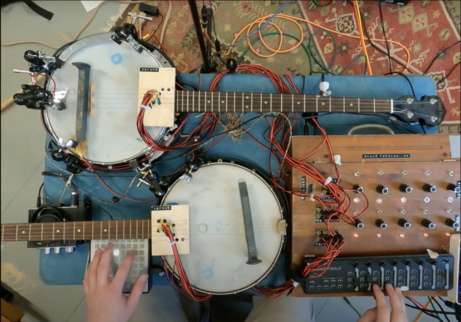
In recent projects Weston Olencki has explored fusions of experimentalism and noise with American traditional music. At the Graham, they premiere new work for pump organ, Sacred Harp hymnody, and electronic synthesis, and offer a vine that grew over the city and no one noticed for electromechanical banjo, magnetic resonators, solenoid motors, AM radio transmitters, handheld radio, railroad spikes, carriage bolts, Markov-driven three-finger banjo picking, and a neural net-generated resynthesis of The Carter Family’s Will the Circle Be Unbroken (1935) as “performed” by the reanimated and digitized voices of Johnny Cash, Dolly Parton, Hank Williams, Charley Pride, Elizabeth Cotten, Jimmie Rodgers, Buck Owens, Loretta Lynn, Uncle Dave Macon, and Willie Nelson.
Weston Olencki (b.1992; Spartanburg, South Carolina) is a musician, composer, and sound artist based in Berlin, Germany. Their current work is centered around questions of instrumental music and its contexts and constructs, various mediated practices of listening and improvisation, and the technological, material, and cultural histories of rural space and time.
They have presented work at the Borealis Festival, Issue Project Room, REDCAT, Donaueschinger Musiktage, Ghent Jazz Festival, Philharmonie Luxembourg, Black Mountain College, Musica Nova Helsinki, the American Academy in Rome, Roulette Intermedium, and Frequency Festival, among other festivals and venues. Residencies include CalArts, Columbia, Harvard, NYU, Northwestern, Princeton, Stanford, and the University of Huddersfield. In 2016 they were awarded the Kranichsteiner Musikpreis from the Internationales Musikinstitut Darmstadt. Their recording project Old Time Music (Tripticks Tapes) was named in Bandcamp’s “best of” 2022 music round-up. They have an extensive discography, with upcoming releases on Astral Spirits and Infrequent Seams. Olencki is an active member of Rage Thormbones, the Wet Ink Large Ensemble, Ensemble Pamplemousse, Clone Decay (with Mary Halvorson and Kalia Vandever), the Hollows (with Nick Dunston and Etienne Nillesen), and other projects, and performs regularly as a soloist and ensemble member on low brass instruments, winds, banjo, organs, and various electronic media.
Image: Courtesy the artist
Presented in partnership with Lampo
Lampo, established in 1997, supports artists working in new music, experimental sound and other interdisciplinary practices. The Chicago-based organization's core activity has been and remains its performance series. Rather than making programming decisions around tour schedules, Lampo invites selected artists to create and perform new work, and then the organization provides the space, resources and curatorial support to help them fulfill their vision. Lampo also organizes artist talks, lectures, screenings and workshops, and publishes written and recorded documents related to its series.
Visitor Guidelines: Masks are strongly encouraged. Visitors to the Graham Foundation understand that there is an inherent risk of exposure to COVID-19 in any public space where people are present. When masks are required, they must cover the nose and mouth at all times and meet CDC standards. Disposable masks are available upon request and will be provided to visitors as required.
Accessibility: Events are held in the ballroom on the third floor, which is only accessible by stairs. Please contact us at 312.787.4071 or info@grahamfoundation.org to make arrangements.
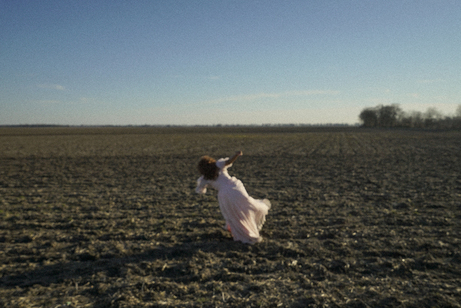
Join us for a reception from 4–6 p.m. with artist Katherine Simóne Reynolds to celebrate the opening of her new exhibition A different kind of tender and the practice of overhealing.
Katherine Simóne Reynolds practice investigates emotional dialects and psychogeographies of Blackness, and the importance of “anti-excellence.” Her work physicalizes emotions and experiences by constructing pieces that include portrait photography, video works, choreography, sculpture, and installation. Taking cues from the midwestern post-industrial melancholic landscape having grown up in the metro east area of Saint Louis, she formed an obsessive curiosity around the practices of healing as well as around a societal notion of progress spurning from a time of industrial success. Utilizing Black embodiment and affect alongside her own personal narrative as a place of departure has made her question her own navigation of ownership, inclusion, and authenticity within a contemporary gaze. She draws inspiration from Black glamour and beauty while interrogating the notion of “authentic care.” Her practice generally deals in Blackness from her own perspective, and she continuously searches for what it means to produce “Black Work.”
Reynolds has exhibited and performed work within many spaces and institutions including the Pulitzer Arts Foundation; The Museum of Modern Art; and SculptureCenter. She has exhibited in national and international group and solo shows, has spoken at the Contemporary Art Museum of Saint Louis, the Saint Louis Art Museum, and the Black Midwest Initiative Symposium at University of Minnesota. Alongside her visual art practice, she has embarked on curatorial projects at The Luminary; SculptureCenter; and upcoming exhibitions for Stanley Museum of Art as well as Clyfford Still Museum.
For more information on the exhibition, A different kind of tender and the practice of overhealing, click here.
Through June 10, 2023
Gallery and Bookshop Hours
Wednesday–Saturday, 12–5 p.m.
For gallery hours and timed-entry reservations, click here to book on tock.com/grahamfoundation
Visitor Guidelines
Please note: The first-floor galleries and bookshop are accessible via outdoor lift. Please call ahead to make arrangements. The second-floor galleries and the third-floor ballroom, where events are held, are only accessible by stairs.
Group tours available by request, contact us at info@grahamfoundation.org
For more information on the exhibition, A different kind of tender and the practice of overhealing, click here.
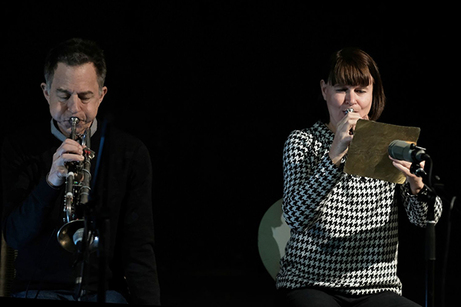
!Trumpet + Trumpet! That is, two trumpets and two very different approaches—one electronic, the other acoustic. While Collins works with a computer program and cobbled hardware, Ulher uses metal sheets, radios, milk frothers, and other everyday objects. The diametrically opposed sound production leads to oddly similar sonic results. At the Graham, Collins (!Trumpet) and Ulher (Trumpet!) perform together and present solo sound and video work.
Collins explains: “After 40 years, I finally figured out how to program a computer to sound like glitching circuits, and cobbled hardware and software into a brass package: a trumpet with a built-in speaker, sensors reading valve positions, a breath control, and an infrared mute. In a nod to David Tudor’s legendary composition Bandoneon! I’ve dubbed my instrument !trumpet. But where Tudor tags on the ‘!’ to indicate factorial, I lead with it as the symbol for logical negation. This is definitely not a trumpet.”
Presented in partnership with Lampo; Lampo gratefully acknowledges additional support provided by the Goethe-Institut Chicago; Travel support provided by Hamburg Ministry of Culture and Media
Birgit Ulher is a Hamburg-based musician who is focused on extending the sounding possibilities of the trumpet. She has developed various techniques and preparations to produce multiphonics and a grainy, textured sound, whether holding objects in front of the horn’s bell or feeding radio noise into trumpet mutes. Ulher performs solo and in various collaborative settings in festivals and venues around the world, partnering with dancers, visual artists, composers and other free improvisers. Recent projects also include video and sound installations.
Nicolas Collins spent years in Europe, where he was artistic director of STEIM (Amsterdam), and a DAAD composer-in-residence in Berlin. He is a professor at the School of the Art Institute of Chicago and a research fellow at the Orpheus Institute in Ghent. An early adopter of microcomputers for live performance, Collins also makes use of homemade electronic circuitry and conventional acoustic instruments. His book, Handmade Electronic Music—The Art of Hardware Hacking (Routledge, 2020), now in its third edition, has influenced emerging electronic music worldwide.
Lampo, established in 1997, supports artists working in new music, experimental sound and other interdisciplinary practices. The Chicago-based organization's core activity has been and remains its performance series. Rather than making programming decisions around tour schedules, Lampo invites selected artists to create and perform new work, and then the organization provides the space, resources and curatorial support to help them fulfill their vision. Lampo also organizes artist talks, lectures, screenings and workshops, and publishes written and recorded documents related to its series.
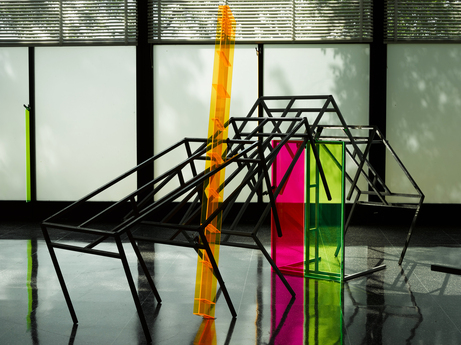
3:00pm | Barbara Kasten in conversation with Stephanie Cristello
4:00pm | Book Signing
Join artist Barbara Kasten alongside author and editor Stephanie Cristello for the official book launch of the monograph Barbara Kasten: Architecture & Film (2015–2020), published by Skira. Delving into unearthed comparisons and histories, this conversation contextualizes Kasten’s ongoing investigations into how moving images and perception play within and through architectural forms.
Since the 1970s, Kasten’s nearly five-decade engagement with abstraction and light has developed through the lens of sculpture, painting, theater, textile, and installation. Well-known within photographic and contemporary art discourse, this publication reconsiders the artist through the broader context of architectural theory. Spanning five years of recent installations following the artist’s first major museum survey Barbara Kasten: Stages (2015–16) at the Institute of Contemporary Art (Philadelphia), the Graham Foundation (Chicago), and MOCA Pacific Design Center (Los Angeles), momentous encounters including Kasten’s Crown Hall (2018) installed within architect Mies van der Rohe’s iconic glass and steel structure and her solo exhibition Scenarios (2020–21) at the Aspen Art Museum serve as a primer to her revolutionary methods of abstraction.
Replete with full-color plates, the book features a long-form interview with Hans Ulrich Obrist following significant collaborations on the design of the stage for Obrist’s Interview Marathon (2018) and the film The New Bauhaus (2019) on artist László Moholy-Nagy; curator Humberto Moro’s interwoven comparison to the sensitivities of space, geometry, and color in the buildings of Mexican architect Luis Barragán; how Kasten’s work remains in conversation with new practitioners from architecture critic and curator Mimi Zeiger; and an elective history informed by Kasten’s early cyanotypes of sacred sites and goddess structures that provide a “stage” to disclose the spiritual basis of her approach to light by editor Cristello.
Presented in partnership with Skira
Stephanie Cristello is a contemporary art critic, curator, and author based in Chicago. Her work focuses on artists who critically engage with the image and its role in visual culture. She graduated from the School of the Art Institute of Chicago in 2013 with a liberal arts thesis in visual critical studies. Cristello was previously the Senior Editor US for ArtSlant (2012–18) and the founding Editor-in-Chief of THE SEEN, Chicago’s International Journal of Contemporary & Modern Art (2013–20). Her writing has been published in ArtReview, BOMB Magazine, Elephant Magazine, Frieze Magazine, Mousse Magazine, OSMOS, and Portable Gray. She has delivered panels at the US Pavilion at the Venice Biennale for Architecture, Independent Curators International (ICI), the Terra Foundation for American Art, Manifest Institute, the Chicago Architecture Biennial, and Nordic Talks. Cristello served as the artistic director of EXPO CHICAGO (2013–2020) and is currently the director / curator at Chicago Manual Style (Chicago) and Curator-at-Large at Kasmin (New York). In 2020–21, she was a curatorial advisor to the 2020 Busan Biennale (South Korea) as well as a guest curator at Kunsthal Aarhus (Denmark), the Malmö Art Museum (Sweden), and the Driehaus Museum (Chicago). Cristello has contributed to numerous exhibition catalogues nationally and internationally, including monographs on the work of Lap-See Lam (Bonniers Konsthall / Lenz Press, 2021), Mamma Andersson and Tal R (Kunsten Museum / Malmö Art Museum, 2022). She is the author of Theodora Allen: Saturnine (Motto / Kunsthal Aarhus, 2021), Sustainable Societies for the Future (Motto / Malmö Art Museum, 2021), and Barbara Kasten: Architecture and Film 2015–2020 (Skira, 2022). In 2020, she was awarded a publication grant by the Graham Foundation for Advanced Studies in the Fine Arts.
Barbara Kasten (b. 1936, Chicago) lives and works in Chicago. She received her BFA from the University of Arizona in 1959 and MFA from the California College of Arts and Crafts in 1970. Kasten’s practice centers around an exploration of the nature of perception and materiality. Her photographic output using both studio and natural lighting has been essential to the last decade of multi-disciplinary work in sculpture, video, installation, and public art. These works continue to examine an object’s presence within both illusionistic and real space. Forms--designated by shadow, color, and the space between objects--oscillate between representation and abstraction. Her work has been exhibited across the United States and Europe. Most recently, Kasten was the subject of a solo exhibition at the Kunstmuseum Wolfsburg, Germany, which traveled to Sammlung Goetz, Germany, and is open through April 2023. Other recent exhibitions include Barbara Kasten: Scenarios, Aspen Art Museum, Colorado; Women in Abstraction, Museo Guggenheim Bilbao, Spain, and Centre Pompidou, France; The 2020 Busan Biennale: Words at an Exhibition—an exhibition in ten chapters and five poems, South Korea; Shape of Light: 100 Years of Photography and Abstract Art, TATE Modern, UK; Sharjah Biennial 14: Leaving the Echo Chamber, Sharjah Art Foundation, UAE; and a retrospective at the Institute of Contemporary Art in Philadelphia that traveled to the Graham Foundation in Chicago and the Los Angeles Museum of Contemporary Art. Her work is featured in the collections such as The Museum of Modern Art, New York; Whitney Museum of American Art, New York; Guggenheim Museum, New York; Tate Modern, London; High Museum of Art, Atlanta; Museum of Fine Arts, Houston; Centre Pompidou, Paris; and the Smithsonian American Art Museum, Washington, DC among many others.
Barbara Kasten: Architecture & Film (2015–2020) was supported by a Graham Foundation publication grant, click here to learn more.
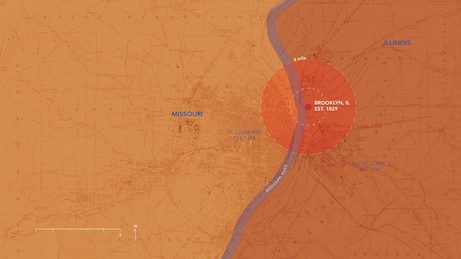
Alicia Olushola Ajayi, Kelley Lemon, and Katherine Simóne Reynolds discuss and explore overlaps and new discoveries in their practices in response to the Reynolds’ Graham Foundation Fellowship exhibition, A different kind of tender and the practice of overhealing. As Reynolds centered her focus for this exhibition on the towns Cairo and Brooklyn in southern Illinois, Ajayi’s research on Brooklyn and Black place making in American history, and Lemon’s initiatives exploring connections between Black owned farms and native landscapes across the state of Illinois provide critical context for considering the historic and current conditions—as well as potential futures—of these Midwest communities and landscapes.
Alicia Olushola Ajayi is an architectural designer, researcher, and writer based in New York and holds master’s degrees in architecture, social work, and criticism. She is currently the program developer for BlackSpace Urbanist Collective and is engaged in independent research about antebellum Black settlements.
Kelley Lemon is a registered professional landscape architect, LEED accredited professional, and EDAC certified. She practices both architecture and landscape architecture, with an emphasis in food, productive landscapes, and healthcare and mental/behavioral health environments. Her interests further dive into design and theory of the built environment by researching and uncovering histories and ecological processes, engaging the people of the community, and developing new techniques and strategies to provide a solution that is of the place and vernacular.
Katherine Simóne Reynolds practice investigates emotional dialects and psychogeographies of Blackness, and the importance of “anti-excellence.” Taking cues from the midwestern post-industrial melancholic landscape having grown up in the metro east area of Saint Louis, she formed an obsessive curiosity around the practices of healing as well as around a societal notion of progress spurning from a time of industrial success. Utilizing Black embodiment and affect alongside her own personal narrative as a place of departure has made her question her own navigation of ownership, inclusion, and authenticity within a contemporary gaze. She is the 2022–23 Graham Foundation Fellow.
Image: Alicia Olushola Ajayi, 1903 Regional Map Missouri and Illinois. Courtesy Alicia Olushola Ajayi
For more information on the exhibition, A different kind of tender and the practice of overhealing, click here.
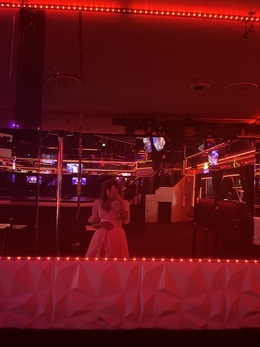
Artist Katherine Simóne Reynolds delivers a performative lecture in conjunction with her Graham Foundation Fellowship exhibition, A different kind of tender and the practice of overhealing. In the exhibition, Reynolds continues her exploration of overhealing from trauma in a new body of work that includes photographs, a two-channel film, sculptures, and other works. Centered on two towns: Cairo, Illinois, at the confluence of the Mississippi and Ohio rivers, and Brooklyn, Illinois—also known as Lovejoy, founded by Priscilla “Mother” Baltimore in 1829 after buying her own freedom, it became the first town incorporated by African Americans in the United States in 1873—the exhibition addresses relationships between perceptions of abandonment and fertility, Black female imagination, and different manifestations of healing as Reynolds looks at the Rust Belt as a kind of keloidal landscape. A different kind of tender and the practice of overhealing is on view at the Foundation through June 10, 2023.
Katherine Simóne Reynolds practice investigates emotional dialects and psychogeographies of Blackness, and the importance of “anti-excellence.” Her work physicalizes emotions and experiences by constructing pieces that include portrait photography, video works, choreography, sculpture, and installation. Taking cues from the midwestern post-industrial melancholic landscape having grown up in the metro east area of Saint Louis, she formed an obsessive curiosity around the practices of healing as well as around a societal notion of progress spurning from a time of industrial success. Utilizing Black embodiment and affect alongside her own personal narrative as a place of departure has made her question her own navigation of ownership, inclusion, and authenticity within a contemporary gaze. She draws inspiration from Black glamour and beauty while interrogating the notion of “authentic care.” Her practice generally deals in Blackness from her own perspective, and she continuously searches for what it means to produce “Black Work.”
Reynolds has exhibited and performed at Pulitzer Arts Foundation, St. Louis; The Museum of Modern Art, New York; and SculptureCenter, Long Island City, NY, among other spaces. Alongside her visual art practice, she has embarked on curatorial projects at SculptureCenter; Stanley Museum of Art, Iowa City; and Clyfford Still Museum, Denver. She is the 2022–23 Graham Foundation Fellow.
For more information on the exhibition, A different kind of tender and the practice of overhealing, click here.
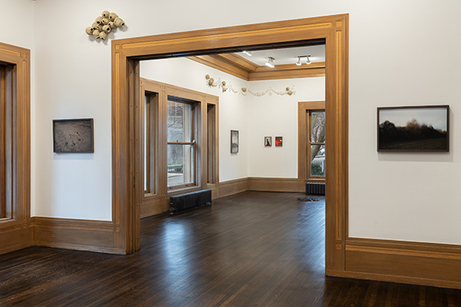
Reading from her debut poetry collection, Bittering the Wound—a first-person retelling of the 2014 Ferguson uprising—and other recent works, Jacqui Germain explores and interrogates periods of political rupture, alongside the related histories, revelations, interiorities, anxieties, and generative possibilities in response to Katherine Simóne Reynolds’ Graham Foundation Fellowship exhibition, A different kind of tender and the practice of overhealing. Part documentation, part conjuring, Bittering the Wound works to share the narrative of the event with more complexity, audacity, care, and specificity than public media accounts typically allow. Here, Germain’s words echo Reynolds’ work on surveillance, vulnerability, and different manifestations of healing.
This event will take place within the exhibition in the first-floor galleries and will be followed by a reception. Copies of Bittering the Wound will be available for purchase in the Graham Foundation Bookshop.
Jacqui Germain is a poet and journalist living and working in St. Louis, Missouri. Her debut full-length poetry collection, Bittering the Wound (Autumn House Press, 2022), was selected by Douglas Kearny for the 2021 Center for African American Poetry and Poetics book prize. Germain's poems have been published in The Offing, Poem-A-Day, Muzzle Magazine, The Rumpus, Bettering American Poetry, and elsewhere, in addition to being anthologized in several texts. She has received poetry fellowships from the St. Louis Regional Arts Commission, Jack Jones Literary Arts, and Callaloo Creative Writing Workshop. Her chapbook, When the Ghosts Come Ashore, was published in 2016 through Button Poetry and Exploding Pinecone Press. Germain’s journalism, original reporting, political commentary, and feature profiles have been published in The Nation, The Guardian, VICE, Artsy, and more. She served as Teen Vogue's Economic Security Project journalism fellow, reporting for the outlet’s politics section.
For more information on the exhibition, A different kind of tender and the practice of overhealing, click here.
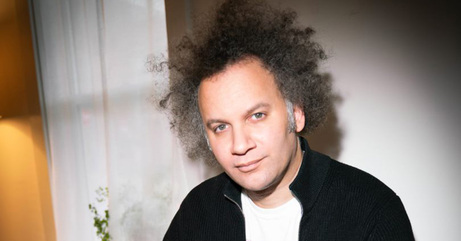
Tyondai Braxton premieres Vali, a sprawling set of new electronic and sample-based music for Lampo, built on ideas of space and contrast, stasis and forward motion.
Tyondai Braxton has been writing and performing music under his own name and collaboratively, under various group titles, since the mid-1990s. He is the former front man of experimental rock band Battles. Braxton has composed commissioned pieces for ensembles such as the Bang on a Can All Stars, Alarm Will Sound, Brooklyn Rider, Third Coast Percussion and Yarn/Wire. In 2012, he collaborated with Philip Glass during the ATP I’ll Be Your Mirror festival. He has also performed his orchestral work Central Market with the Los Angeles Philharmonic, London Sinfonietta, BBC Symphony Orchestra, and New York’s Wordless Music Orchestra. In 2013, Braxton premiered the multimedia piece HIVE at the Guggenheim Museum in New York City, with subsequent performances at Sacrum Profanum Festival, Krakow; the Barbican, London; and at the Sydney Opera House. His 2022 album Telekinesis is an 87-piece work for electric guitar, orchestra, choir and electronics (Nonesuch). Braxton was recently appointed to Princeton University’s Music Composition faculty as an Assistant Professor of Music.
Presented in partnership with Lampo
Lampo, established in 1997, supports artists working in new music, experimental sound and other interdisciplinary practices. The Chicago-based organization's core activity has been and remains its performance series. Rather than making programming decisions around tour schedules, Lampo invites selected artists to create and perform new work, and then the organization provides the space, resources and curatorial support to help them fulfill their vision. Lampo also organizes artist talks, lectures, screenings and workshops, and publishes written and recorded documents related to its series.
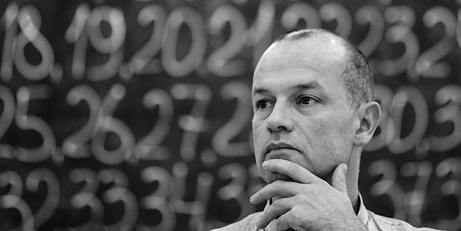
To mark the 25th anniversary of Lampo, Marcus Schmickler has composed new multi-channel music, concerned with spectral transformations of percussion instruments and bells. “Let’s expect the kind of playful electronic music that we crave,” writes Marcus, “deploying technology at the service of creating uncanny sensations.”
Marcus Schmickler is a composer who works at the intersections of computer music and ensemble composition, performance, and research. He is interested in data sonification, or the translation of data into sound, as well as in psychoacoustics and the compositional potential in various auditory illusions, from Shepard tones to ring modulations. His writings about computer music have appeared in MusikTexte, among other publications. His discography consists of over 50 titles, including choir- and chamber music pieces, computer music compositions, electroacoustic works, and his post-rock project Pluramon. Since 2010, Schmickler has taught at Bard College in Annandale-on-Hudson, NY, at CalArts in Valencia, CA, and at the Robert Schumann Hochschule in Düsseldorf, Germany. He currently lives in Rome, as a Villa Massimo Rome Prize Fellow of the German Academy.
Marcus Schmickler has performed several times for Lampo, most recently in February 2018 with Thomas Lehn. His first Lampo performance was in September 2002.
Presented in partnership with Lampo, additional support provided by the Goethe-Institut Chicago
Lampo, established in 1997, supports artists working in new music, experimental sound and other interdisciplinary practices. The Chicago-based organization's core activity has been and remains its performance series. Rather than making programming decisions around tour schedules, Lampo invites selected artists to create and perform new work, and then the organization provides the space, resources and curatorial support to help them fulfill their vision. Lampo also organizes artist talks, lectures, screenings and workshops, and publishes written and recorded documents related to its series.
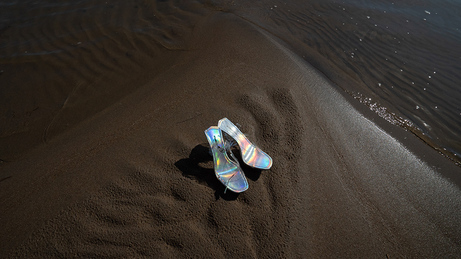
2 p.m.—Performance
3 p.m.—Closing Reception for A different kind of tender and the practice of overhealing
Jared Brown and Regina Martinez present a live score in response to Katherine Simóne Reynolds’ Graham Foundation Fellowship exhibition, A different kind of tender and the practice of overhealing.
Jared Brown is an interdisciplinary artist born in Chicago. In past work, Brown broadcasted audio and text based work through the radio (CENTRAL AIR RADIO, 88.5 FM) in live DJ sets and on social media. They consider themselves a data thief, understanding this role from John Akomfrah's description of the data thief as a figure that does not belong to the past or present. As a data thief, Brown makes archeological digs for fragments of Black American subculture, history, and technology. They repurpose these fragments in audio, text, and video to investigate the relationship between history, digital, immaterial space. Brown holds a bachelor’s degree in video from the Maryland Institute College of Art. In 2016, Brown returned to Chicago to make and share work that directly relates to their personal history.
Regina Martinez is a sound centered artist based in Chicago. Her current experiments draw from an archive of infinitely personal recordings she relates to as soundmarks: her father’s hands cleaning dried beans, drumline rehearsal after school, her mother praying the rosary the night before her heart procedure, and the creak of the front gate to home. Each recorded moment becomes its own instrument, its own layer of composition, and a washing and wringing out of memory meant to be overheard like a poem again and again. She grew up in Saint Louis, Missouri where she was artistic director of the Pink House neighborhood art space for creative exchange with children and their families. She is co-creator of “the clothesline” monthly one-night audio-visual installation in St. Louis. More recently she was program manager for Threewalls in Chicago and received a master’s degree in sound arts & industries from Northwestern University.
Photo: Katherine Simóne Reynolds
For more information on the exhibition, A different kind of tender and the practice of overhealing, click here.
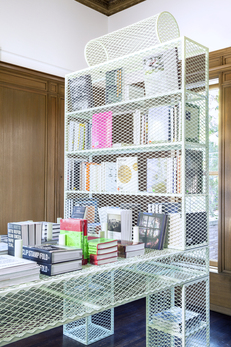
Visit the Graham Foundation Bookshop during a two-day sale to celebrate the 10th anniversary of the bookshop, designed by Chicago-based designer Ania Jaworska and commissioned by the Graham Foundation in 2013. To mark the occasion, the bookshop will take over the Madlener House first-floor galleries, and all purchases will be 20% off with select titles discounted up to 50% off.
SALE HOURS
Saturday, June 24, 11 a.m.–7 p.m.
Sunday, June 25, 12–5 p.m.
The Graham Foundation Bookshop offers a selection of publications produced by the Foundation's grantees and titles related to our public programming, as well as new, historically significant, and rare publications on architecture, urbanism, art, and related fields.
Advance registration not required
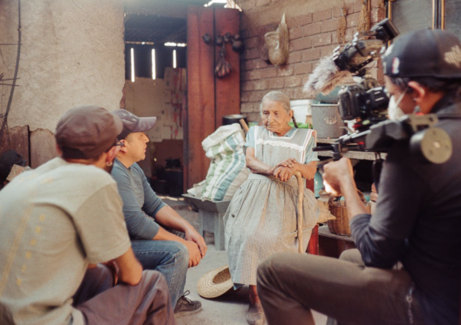
The documentaries in the Living Treasures series, led by the collective Innovando la Tradición, record the life stories and techniques of established potters from Oaxaca. Living Treasures highlights the memories and teachings of these storied potters—enabling the series to transcend individual stories to provide examples of the challenges that villages currently face and the strategies of resistance in response. Shown for the first time in the United States, the Living Treasures film screened at the Graham celebrates Doña Amelia who, at 95 years old, is the last traditional potter from Ixtlán de Juárez.
A conversation with Innovando la Tradición founders, Kythzia Barrera and Diego Mier y Terán will follow. Kythzia and Diego will talk about what they have learned by working with indigenous potters in Mexico, how it has shaped their practice and worldview, and their experience working in the interstices between design, community organizing, commerce and social practice. In describing the work of Innovando la Tradición, they write:
Clay is alive. We serve artisan communities by developing conditions for their well-being, agency and autonomy. We transform dominant narratives through contact with the soil. We generate care of our human, social and natural environment. We create bridges between the wisdom of the handmade and the world. We are and operate as a community. We learn and are transformed together. We maintain spaces for individual and collective creativity. We are proud of what we do. We are all clay.
This program is presented in partnership with the Chicago Architecture Biennial: CAB 5: This is a Rehearsal.
Innovando la Tradición is a collective and multidisciplinary nonprofit that seeks to revitalize traditional pottery in Oaxaca, Mexico to bring visibility to the profound knowledge of this centuries-old craft. The organization positions pottery as a tool of economic stability, cultural development, an agent of social cohesion, and a source of inspiration in the construction of new paradigms for a more balanced relationship with the world. This mission is realized through workshops, courses, and skill exchanges to share the work of master potters and pass on the discipline to younger artisans.
Kythzia Barrera is an industrial designer, and cofounder of Innovando la Tradición and Colectivo 1050º, organizations that support the development of pottery communities in Oaxaca, Mexico. Barrera’s work strengthens the bridges between art, craft, and design to foster social and human change. Honesty and open disclosure from the conventional and privileged designers position shapes an essential part of Kythzia's creative leadership as Head of Innovando Tradición and dynamic CEO of Colectivo 1050º. She holds a master’s degree in social and sustainable design by The Design Academie Eindhoven, Netherlands; in addition to having completed postgraduate coursework in ceramics at the School of Art and Design Helsinki, Finland; and in crafts and design at Kyoto Institute of Technology. She previously served as sustainable design professor at Centro and Universidad Iberoamericana, Mexico.
Diego Mier y Terán is cofounder and director of Innovando la Tradición and Colectivo 1050º and is interested in the social and ethical dimension of design and its power as an agent of change. He holds a master’s degree in type design from Royal Academy of Art, The Hague, Netherlands. Terán teaches across many universities in Mexico and previously ran the Workshop of Utopias at the Universidad Iberoamericana which prepared students to challenge the conventions of contemporary society and design practice.
Image: On-site filming of the potter Doña Amelia for the Innovando la Tradición documentary series "Living Treasures," Ixtlán de Juárez, Oaxaca, Mexico, 2023. Courtesy Innovando la Tradición. Photo: Adrián Gutiérrez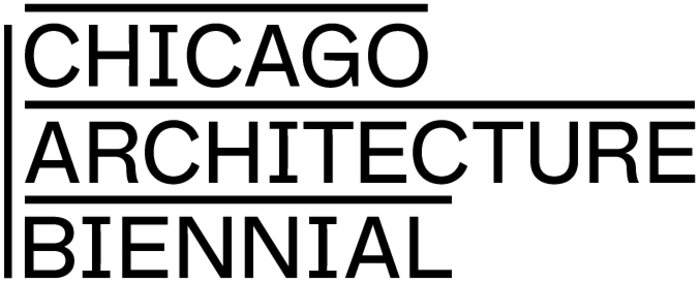
Judith Hamann performs their Humming Suite, a concert-length program focused on cello and voice in different permutations, alongside companion pieces that explore similar musical territories.
“Humming traces a particular kind of interiority,” says Judith. There is an intimacy and vulnerability in a close-mouthed hum that teeters on the edge of audibility. In performance, bow stroke and breath often break, disturb, and interfere as much as they meld together. And it is not always clear where sounds are coming from, suggesting something like a form of ventriloquism. Taken together, the outcome is a collection of works of delicate balance and volatile fragility.
Judith Hamann (b.1983, Melbourne, Australia) is a composer and cellist, currently based in Berlin. Their work encompasses performance, electroacoustic composition, site-specific generative work, and microtonal systems in a process-based creative practice. Judith has performed widely, including at Tectonics (Glasgow, Adelaide, Athens), UnSound (New York City), Sonic Acts (Amsterdam), Maerzmusik (Berlin), CTM (Berlin), the Venice Biennale Musica (Venice), Tokyo Experimental Festival (Tokyo), and Festival Aural (Mexico City). Collaborators include Marja Ahti, Joshua Bonnetta, Pascale Criton, Charles Curtis, Sarah Hennies, Yvette Janine Jackson, and Anike Joyce Sadiq. Judith’s work has been published by Blank Forms, Black Truffle, Another Timbre, and Longform Editions. Judith holds a D.M.A. from the University of California San Diego.
Since 2010, the Graham Foundation has partnered with Lampo to produce an international performance series held at the Madlener House. Lampo, founded in 1997, is a nonprofit organization for experimental music and intermedia projects.
Lampo, established in 1997, supports artists working in new music, experimental sound and other interdisciplinary practices. The Chicago-based organization's core activity has been and remains its performance series. Rather than making programming decisions around tour schedules, Lampo invites selected artists to create and perform new work, and then the organization provides the space, resources and curatorial support to help them fulfill their vision. Lampo also organizes artist talks, lectures, screenings and workshops, and publishes written and recorded documents related to its series.
Photo: Martina Biagi
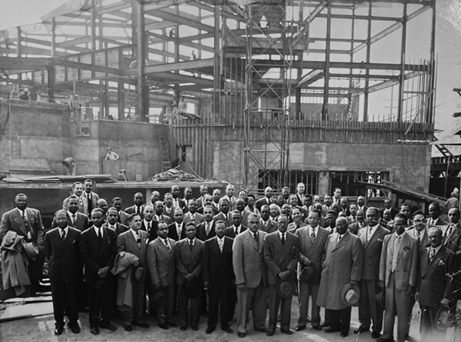
In partnership with the Society of Architectural Historians (SAH) and Places Journal, the Graham is pleased to present a new lecture by architectural historian Ginger Nolan, the inaugural recipient of the SAH | Places Prize on Race and the Built Environment, a unique collaboration between SAH and Places that supports the production of a major work of public scholarship that considers the history of race and the built environment through a contemporary lens.
Nolan’s talk explores how African American-owned insurance companies negotiated the (often vexed) aims of pursuing financial gain while also trying to create more equitable cities. For most of the twentieth century, these insurance companies controlled more wealth than any other African American enterprise and played an outsize role in shaping cities and suburbs. In efforts to reverse the effects of redlining, disinvestment, and segregation, these companies used housing developments and corporate architecture—including the first and only African American skyscraper—to redress discriminatory forms of urbanism and racial stereotypes. The talk will evaluate the urban and architectural interventions of African American insurance companies, using the companies' office buildings, housing developments, and mortgage-lending practices to engage debates around Black capitalism and Black Marxism. While recent scholarship has focused on the biopolitical tendencies of the white-owned insurance industry, the history of African American insurance demands a more subtle analytical framework, as these companies’ efforts vacillated between the biofinancial logics of actuarial techniques and, on the other hand, strategies of care and contestation.
Following the talk, architectural historian Charles L. Davis II will moderate a discussion with Nolan. Davis is an associate professor of architectural history and criticism at the University of Texas at Austin and chair of the SAH Race + Architectural History Affiliate Group.
SAH will host a reception at the Charnley-Persky House, located at 1365 N Astor St, immediately following the event.
This program is presented in partnership with the Chicago Architecture Biennial: CAB 5: This is a Rehearsal.
Ginger Nolan is an assistant professor of architectural history and theory at the University of Southern California. Her research explores relationships between architecture, media technologies, race, and governmentality. She has published through the University of Minnesota Press the books Savage Mind to Savage Machine: Racial Science and Twentieth-Century Design (2021) and The Neocolonialism of the Global Village (2018). She is currently researching race, actuarial thought, and urbanism, focusing on the role of twentieth-century African American insurance companies in shaping cities and suburbs in the United States. Her work has been recognized by the the Deutscher Akademischer Austauschdienst, Graham Foundation, Social Science Research Council, and the Terra Foundation. In 2013 Nolan was awarded the Carter Manny Writing Award by the Graham Foundation for her dissertation, “Savage Mind to Savage Machine: Techniques and Disciplines of Creativity, ca. 1880–1985.”
Founded in 1940, the Society of Architectural Historians is an international nonprofit membership organization that promotes the study, interpretation and conservation of architecture, design, landscapes and urbanism worldwide. SAH serves a network of local, national and international institutions and individuals who, by profession or interest, focus on the built environment and its role in shaping contemporary life. SAH promotes meaningful public engagement with the history of the built environment through advocacy efforts, print and online publications, and local, national and international programs.
Founded at MIT and Berkeley in 1983, Places Journal is an independent, nonprofit journal of public scholarship on architecture, landscape, and urbanism. Bridging from the university to the profession to the public, Places features scholars, journalists, designers, and artists who are responding to the profound challenges of our time: environmental health and structural inequity, climate crisis, resource scarcity, human migration, rapid technological innovation, and the erosion of the public sphere.
Established in 2021, the SAH | Places Prize was envisioned by Charles L. Davis II, associate professor of architectural history and criticism at the University at Buffalo, SUNY, and cochair of the SAH Race + Architectural History Affiliate Group. The winner of the SAH | Places Prize receives an honorarium to produce a major work of public scholarship to be presented as a public lecture through the Society of Architectural Historians and published in Places Journal.
SAH Race + Architectural History Affiliate Group was established by the Society of Architectural Historians in 2019 to promote research activities that analyze the racial discourses of architectural history, past and present. The group aims to create a platform for existing and new scholarship in the field; to reach new publics for this work; and to develop mentorships and networking opportunities for graduate students and junior scholars.
Image: Construction site, Golden State Mutual Life Insurance Home Office Building, Los Angeles, ca.1948, designed by the office of Paul Williams. Golden State Mutual Life Insurance Company records (Collection 1434). UCLA Library Special Collections, Charles E. Young Research Library, University of California, Los Angeles, Box 61, Folder 11

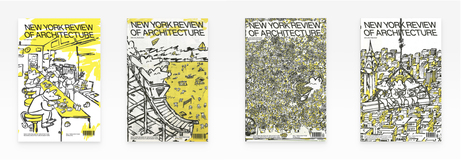
New York Review of Architecture visits Chicago during the Chicago Architecture Biennial opening weekend to connect with Chicago-based contributors and readers. Join New York Review of Architecture and Zach Mortice, Anjulie Rao, and Pete Segall, for readings and conversation at the Graham Foundation.
This program is presented in partnership with the Chicago Architecture Biennial, CAB 5: This is a Rehearsal
New York Review of Architecture is an independent publication that reviews architecture in New York, among other places. In addition to its print issues, New York Review of Architecture also publishes a weekly online newsletter, called Skyline, and hosts events. It serves the public who are too busy building to keep up with the flood of conversation around the built environment with reviews that are concise, engaged, and a little irreverent. New York Review of Architecture was founded in 2019 by Nicolas Kemper, Dante Furioso, Sarah Kasper, James Coleman, and Julie Turgeon. New York Review of Architecture has been supported by the Graham Foundation.
Pete Segall lives in Chicago. His fiction and nonfiction have appeared in The Drift, New York Review of Architecture, Defector, Conjunctions, and elsewhere.
Zach Mortice is a Chicago design journalist and critic that focuses on the intersection of public policy with architecture and landscape architecture.
2021 | New York Review of Architecture, New York Review of Architecture, 2021
http://www.grahamfoundation.org/grantees/6254-new-york-review-of-architecture-2021
2022 | New York Review of Architecture, New York Review of Architecture, 2022
http://www.grahamfoundation.org/grantees/6404-new-york-review-of-architecture-2022
2023 | New York Review of Architecture, Los Angeles Review of Architecture
http://www.grahamfoundation.org/grantees/6530-los-angeles-review-of-architecture
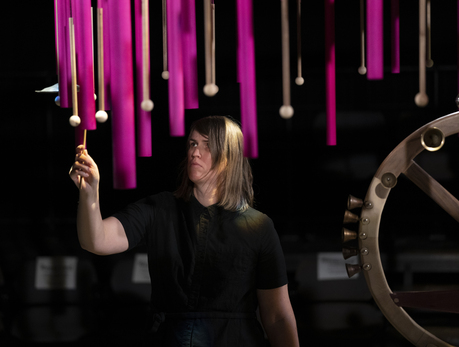
Sarah Hennies premieres Standing Water !!!—her first new composition in five years—and writes that the music “draws from my past work on the vibraphone alongside field recordings and, most significantly, a newfound interest in gongs and other resonant objects.” Hennies reflects, “While my past percussion music often involved long periods of repeating single sounds and chords, this new work operates on a different time scale—more spacious, less physically grueling, but no less focused on immersing the listener in its resonant world.” She concludes, “Originally stemming from work I am doing to document many unheard works by the percussionist/composer Michael Ranta, these instruments have found their way into my own practice in this new solo work and a major duo project with New York bassist Tristan Kasten-Krause.”
Sarah Hennies (b.1979, Louisville) is a composer based in upstate New York whose work is concerned with a variety of musical, sociopolitical, and psychological issues including queer and trans identity, love, intimacy, psychoacoustics, and the social and neurological conditions underlying creative thought. She is primarily a composer of acoustic chamber music, but is also active in improvisation, film, and performance art. She presents her work internationally as both a composer and percussionist with notable performances at MoMA PS1 (NYC), Monday Evening Concerts (Los Angeles), Le Guess Who (Utrecht), Festival Cable (Nantes), send + receive (Winnipeg), O’ Art Space (Milan), Cafe Oto (London), ALICE (Copenhagen), and the Edition Festival (Stockholm). As a composer, she has worked with a wide array of performers and ensembles including Bearthoven, Bent Duo, Claire Chase, ensemble 0, Judith Hamann, R. Andrew Lee, The Living Earth Show, Talea Ensemble, Thin Edge New Music Collective, Two-Way Street, Nate Wooley, and Yarn/Wire.
Her groundbreaking audio-visual work Contralto (2017) explores transfeminine identity through the elements of “voice feminization” therapy, featuring a cast of transgender women accompanied by a dense and varied musical score for string quartet and three percussionists.
Hennies is the recipient of a 2019 Foundation for Contemporary Arts Grants to Artists Award, a 2016 fellowship in music/sound from the New York Foundation for the Arts, and has received additional support from the Fromm Foundation, Mid Atlantic Arts Foundation, New Music USA, the New York State Council on the Arts, and the Creative Work Fund.
As a scholar and performer, she is engaged with ongoing research about the percussion music of Iannis Xenakis and a recording project to document music by the American percussionist and composer Michael Ranta. She teaches at Bard College.
Since 2010, the Graham Foundation has partnered with Lampo to produce an international performance series held at the Madlener House. Lampo, founded in 1997, is a nonprofit organization for experimental music and intermedia projects.
Image: Sarah Hennies performing in A Kind of Ache, 2022. Courtesy the artist. Photo: David Andrews
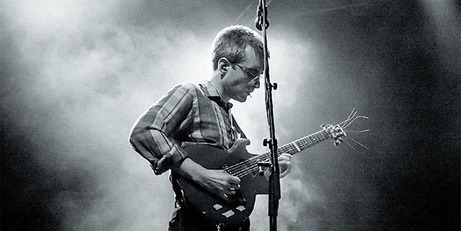
Owen Gardner premieres Where Is My Hand in Space? — a new suite of pieces for microtonal electric guitar and fixed media.
Here, he continues his project of defamiliarizing traditional musical grammar. Gardner treats sound equally as matter and as an articulation of time, while perception is a means to soften the boundaries between performer, audience, and their environment.
Owen Gardner (b.1985, Annapolis, Md.) is a Berlin-based composer, performer, and improviser. His work is guided by the generative tension between experimental and traditional approaches, in solo and ensemble settings, primarily as a guitarist in the leaderless quartet Horse Lords. In addition to his own music, Gardner has performed works by Catherine Lamb, Jackson Mac Low, and Julius Eastman, and has worked with Matmos, Dan Deacon, the Harmonic Space Orchestra, and Future Islands. He also sings early American choral music with Sacred Harp Berlin, studies the theory and instrumental technique of Mauritanian classical music with Sidi ould Ahmed Zeidan, and has programmed and promoted experimental music for many years, both as a member of Baltimore’s High Zero collective and at Berlin’s KM28.
Since 2010, the Graham Foundation has partnered with Lampo to produce an international performance series held at the Madlener House. Lampo, founded in 1997, is a nonprofit organization for experimental music and intermedia projects.
Lampo, established in 1997, supports artists working in new music, experimental sound and other interdisciplinary practices. The Chicago-based organization's core activity has been and remains its performance series. Rather than making programming decisions around tour schedules, Lampo invites selected artists to create and perform new work, and then the organization provides the space, resources and curatorial support to help them fulfill their vision. Lampo also organizes artist talks, lectures, screenings and workshops, and publishes written and recorded documents related to its series.
Note: This event will be held in the ballroom on the third floor of the Madlener House, which is only accessible by stairs. The first-floor galleries and bookshop are accessible via outdoor lift. Please contact us at 312.787.4071 or info@grahamfoundation.org to make arrangements.
Photo: Hansueli Schaerer
Unless otherwise noted,
all events take place at:
Madlener House4 West Burton Place, Chicago
GALLERY AND BOOKSHOP HOURS
2025 Chicago Architecture Biennial
SHIFT: Architecture in Times of Radical Change
Sep 19, 2025–Feb 28, 2026
Wed–Sat, 12–5 p.m.
CONTACT
312.787.4071
info@grahamfoundation.org
Accessibility
Events are held in the ballroom on the third floor which is only accessible by stairs.The first floor of the Madlener House is accessible via an outdoor lift. Please call 312.787.4071 to make arrangements.
Copyright © 2008–2026 Graham Foundation. All rights reserved.
